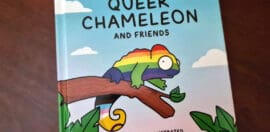Seeking asylum: ‘I don’t believe you can lock up someone’s brain’

Photo: Sam Biddle
30 November 2021 at 8:23 am
A new book from Black Inc. in partnership with the Asylum Seeker Resource Centre, Seeking Asylum: Our Stories, captures the stories of those who have lived experience of seeking asylum. In this extract, Betelhem shares her story of how she came to be in Australia.
I was on the boat for six days. I was the only Ethiopian, so I couldn’t communicate with anyone. It was very scary and I was young – I turned 21 on the boat. We ran out of food and, on the fifth day, petrol. I didn’t think we would survive. There was a big storm and the boat started to leak. On the sixth day, Australian Border Force found us and took us to Darwin.

Betelhem. Photo: Sam Biddle
After five days, guards came in the middle of the night and asked, “Do you want to go to Nauru?” I didn’t know what they meant. They told me there were education facilities there, good medical treatment and fair processes. I trusted them so I agreed to go.
Ten of us, all women, were taken to Nauru. When we arrived, we saw tents and lots of children and families crying. I was confused. Because I was the only Ethiopian, I couldn’t understand what anyone was saying. For 10 months we didn’t have phones, television or radio, so there was no way to find out where I was. We were the first people transferred to Nauru and the detention centre was still being built. When we did get a phone, we were only allowed to use it once a month for 15 minutes. If your family didn’t answer, that was your chance gone.
Nauru was so hot. I’d never experienced heat like that before. For the first month, I vomited every time I ate. We were allowed one two-minute shower a day and we had to line up in the sun for it. The guards took our IDs while we showered. I didn’t have any spare clothes, so I sewed new ones out of a sheet. I can’t describe how bad the situation was. It was punishment, torture. The Australian government used our bodies as a human fence to stop the boats. Some of us died. We lost our friends, our time, our minds.
I lived on Nauru for 15 months. I tried to survive by reading the Bible (I’m Ethiopian Orthodox) and studying English. I asked the guards to teach me two English words a day. If I had spoken English when they told me about Nauru, I would have refused to go.

Photo: Sam Biddle
My mental health suffered, and I was transferred to Brisbane for medical treatment. I thought this would help me feel better, but they locked me up again. Brisbane detention was the hardest experience of my life. Everyone there was from Nauru and they were always crying. When people shouted, self-harmed or were seized by guards, it made me even more stressed.
In 2016, a friend of mine was taken from our room in the middle of the night and transferred to Nauru. She set herself on fire. I saw what had happened to her on the news. We had slept next to one another in the same room for a year. I was devastated. It was Easter, so I called my family. My mother told me my grandma had passed away. My friend and now my grandmother. I had never felt so alone.
That’s when I gave up. I went on a hunger strike and lost five kilograms in two weeks. After this, security guards watched me 24 hours a day. Even when I showered, I couldn’t close the door. Every 30 minutes the guards wrote a report about what I was doing. I was in and out of hospital for a year.
After four years in detention I was told, “You are free to go today”. I was shocked. Where would I go? I had no family.
I was given a place to stay for five months, but I wasn’t used to being a free person anymore. I had forgotten how to use the phone, the TV, the oven. Everything. It was like being born again.
I was traumatised by what I had seen in detention, but I was strong. I studied for certificates in aged care, disability services and childcare. I wasn’t allowed to study on my visa, but I traded cigarettes with people in exchange for them enrolling in Open College for me. In total, I completed more than 10 certificates.
After five months they told me I had 21 days to find a place to live and a job. Until then I had not been allowed to work. I didn’t know how to write a résumé and I didn’t have a driver’s licence.

Photo: Sam Biddle
Luckily there was a demonstration outside the immigration office on the day I signed my release papers. People were protesting against the bridging visa not allowing us to work or study. One of the protestors smiled at me and offered me a room. “Don’t worry,” she said, “You can stay with me”. I was so surprised by this kindness from a total stranger. I stayed with her for a month while I found a place of my own.
Most of my friends are still in detention. I never want what happened to my friend in Brisbane to happen to anyone else. The ASRC provided me with four months of advocacy training. It wasn’t easy. At first, every time they spoke about our experience in detention, I would cry, but the training made me strong and confident. Now I speak at rallies. When I do this, my mind becomes more peaceful. I have the microphone now and I am helping others.
I moved to Melbourne in 2019. It feels like home here. When I got a job with Metro as a ticket inspector, I was so happy. In detention they used to call me by my boat ID, “TAS 16”, but now my nametag says “Betelhem”. I have my identity back.
Although I’m still not allowed to study on my bridging visa, I’m trying to study nursing this year. I don’t believe you can lock up someone’s brain.
This is an extract from Seeking Asylum: Our Stories.
The Asylum Seeker Resource Centre in partnership with Black Inc., has published Seeking Asylum: Our Stories, featuring the stories of refugees, shared in their own words. 100 per cent of net proceeds go directly to the ASRC to support and empower people seeking asylum. Out now in all good bookshops and shop.asrc.org.au RRP: $39.99 (hardback)









‘Seeking Asylum’ book extract is outstanding in the ‘matter of fact’ horror of the story…….Thank you